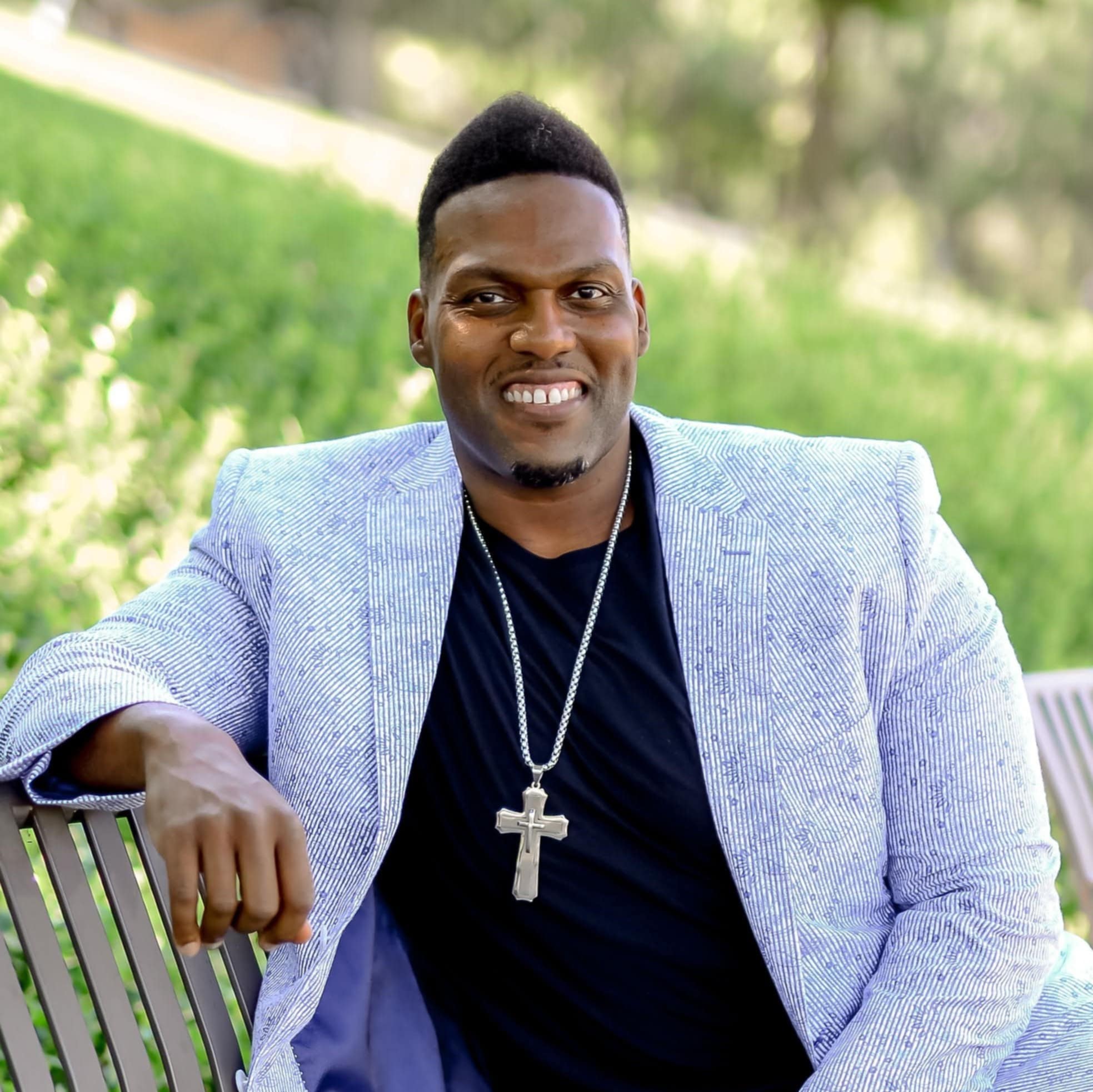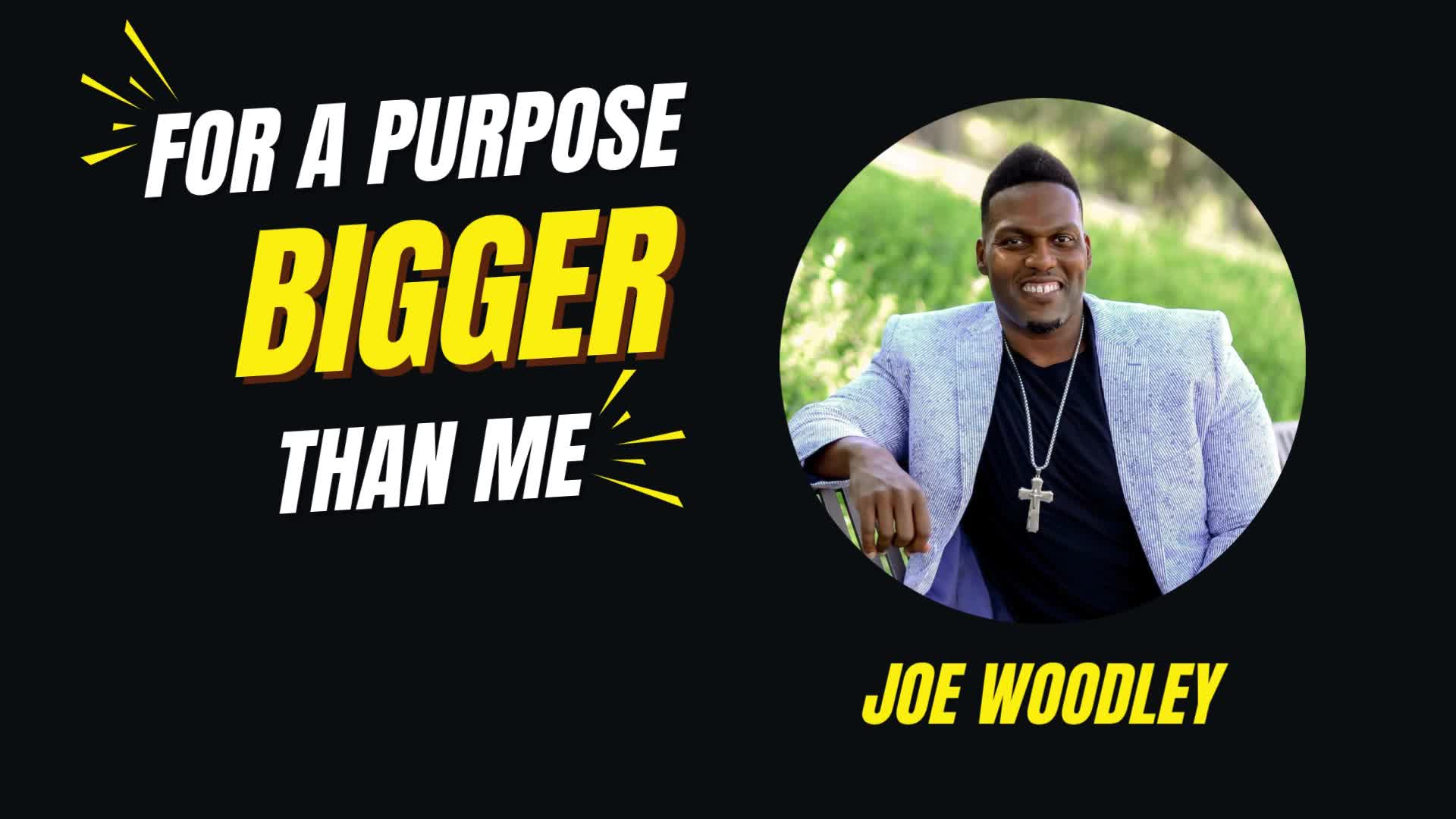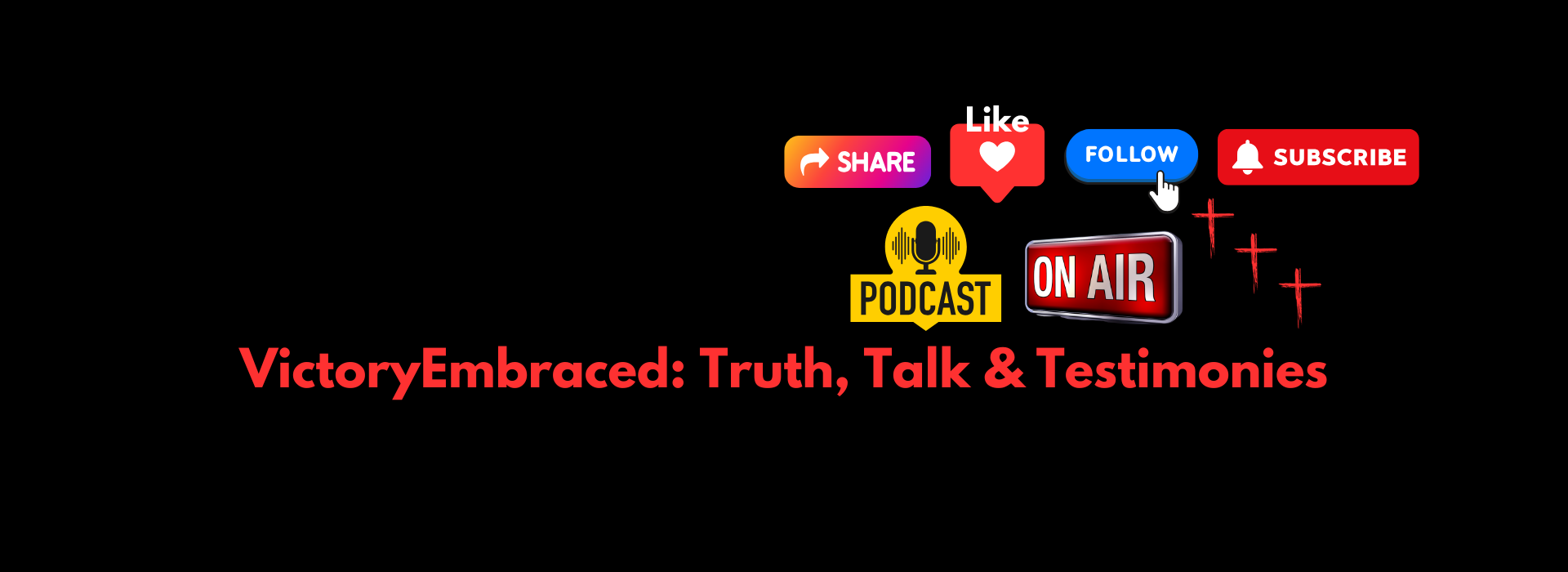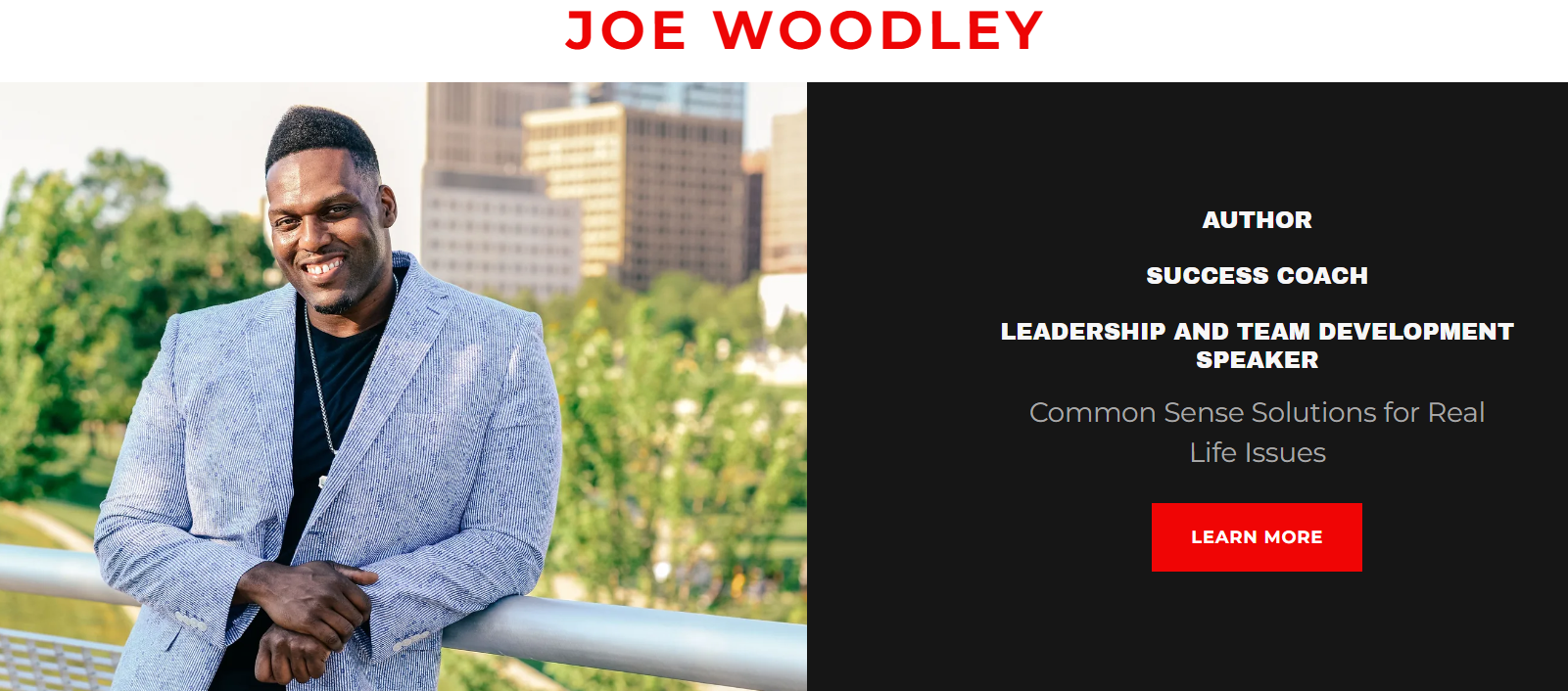Joe Woodley is the author of over 18 books for adults and children, centered on character, leadership, fatherhood, and faith. His latest, For a Purpose Bigger Than Me, is a 16-week devotional and journal for personal and spiritual growth. A faculty member at West Virginia Community College, Joe weaves leadership principles into his teaching and leads a powerful prison ministry for men. As a life and success coach, he inspires growth in schools, churches, businesses, and beyond through keynote addresses and customized curricula delivered nationwide.
Joe Woodley
Author, Success Coach, Leadership & Team Development Speaker
These are Joe's favorite scriptures...
Joe, you grew up in a Christian home, but there was a time in your life when you stepped away from your faith only to return to the Lord. Could you share about that time and what led you back to Christ?
Absolutely. First, I want to say that I’m very thankful for my childhood and for my mother for taking us to church. Some people say, “Well, they don’t want to go; I won’t make them.” Attending church certainly planted a seed in me, which was crucial to my eventual return. But when I was small, I think I was angry and confused. My father left when I was young, and it was at this point that life became tough, and I was searching for my identity. My grandfather, who stepped in like a surrogate father, passed away when I was eleven. He lived several streets away and was a pastor—we come from a family of pastors, and I think it had a greater impact on me than I realized. I was not the most outgoing individual to begin with. Still, I became much more of an introvert at that moment, and I questioned life, my purpose for being here, and pretty much everything, because I felt so alone and angry. Then, I had an uncle who returned to New York, and he stepped in, in a way, and then soon after my senior year of high school, he too passed away. So, there was so much hurt, angst, and disappointment in my life, and I didn’t have straightforward answers for why these different things were happening. Again, I had a wonderful family, and my mother prayed for us and with us daily—we were truly a Christ-centered home, but I had a lot of questions. Additionally, we were part of a smaller church, and as unfortunate as this may sound, I think larger churches in the community also looked down upon us. However, we had a dynamic choir and worship team, and the Spirit of God moved. But I saw the hurt that my grandmother went through because when you’re a pastoral family, you see the tears that other people don’t see or hear about. She didn’t talk about things that much. Still, you could see it on her, and so, in that anger and in that resentment for everything that was going on, and from the hurt of my father leaving. These men who had become father figures, and the hurt and disappointment I saw in how the people of God were treating one another, led me to leave and start withdrawing. I didn’t want anything to do with the church, to be quite honest. I was like, if church people treat each other this way, why would I want to be a part of that? Not having the maturity at that stage in my life to process all of those things, I went out into the world and was like a wild horse, doing just about anything and everything that I was big enough and bad enough to do, and my life headed downhill quickly. I eventually moved to Ohio when I was 23, after being born and raised in New York, to be with a woman with whom I had a long-distance relationship, and things continued to deteriorate in my life. Then, I began a relationship that resulted in my son’s conception. I didn’t want my son to go down the road that I was going down—I wanted to be the best father I could be because that was something that I didn’t have growing up, and I knew that the only one who could help me to do these things was God. I knew that I didn’t want to end up like so many people that I knew who had children all over the place without their fathers. So, the Lord brought me back into the church. I started attending a church that was perfect for me at the time because it was a heavily disciplinarian ministry, and that’s what I needed, as I was out in the world. Accountability, challenge, and forward momentum were what I needed to avoid wandering, and someone guided me. My mentors challenged me to grow and develop, and through that, the Lord began to work in my life. And I’m grateful because God saved my life, not just my soul. He saved my life through that ministry so I wouldn’t wind up as one of these men who are out there with children all over the place and have no idea who they are. Still, more importantly, so I would grow in the truth of who God is, the Word of God, and His character, integrity, purpose, and promises for my life. This needed to happen, so God placed me exactly where I needed to be and where I wanted to be. In contrast, I think many believers would be resistant to that type of discipline because they may feel that they can handle things on their own, and they told me that I couldn’t handle things on my own and they would be in my business, and that helped me to grow in the Word of God and the things of God. The Lord knows what I needed, and He knows what everyone needs. I would challenge you to submit to someone who is an authority. I challenge you to submit to an authority figure, allowing them to guide you so that God’s gifts can mature and be fully manifested in your life.
You minister now, correct? Yes, I do.
When we spoke on the phone, you said that we are vessels to be used by God. How do you get your sermons?
Well, number one, I’m always going before the Lord and praying, which is the first and foremost thing you’ve got to do. The Holy Spirit will speak to you. He speaks to us in different ways, but when He speaks to me, He’ll then show me things about the things I see happening around me. I see things that are happening in the spirit—everything is spiritual and has a spiritual core. Then, He’ll lead me into the scriptures. And not just like one scripture because we need to be careful about that—using one scripture can be taken entirely out of context, so He’ll show me scriptures, a chapter, a passage in the Bible and how it correlates with what’s going on and what His will is in correlation to that scripture and whether it lines up or is misaligned with the Word of God. And then, through that process, He’ll give me the message to share, and I fully yield to the Lord. Take this message however you want to take it. Yes, I research to understand the historical and cultural contexts of the scripture and its original meaning. Still, I also seek what the Holy Spirit wants to accomplish—what message He wants to communicate to people—through these scriptures. Mind you, the first ministry is happening to me. He’ll speak to me and get my heart right. So when He begins to minister to me, and I begin to research and study the scriptures, and He shows me how they correlate, then I say, “Lord, you have to get my heart right. I’ll then ask myself, “How is my heart in correlation to scripture?” So if it’s a word of correction, then, Lord, “You need to correct my heart.” If it is a word of inspiration, then, Lord, “Inspire my heart. If it’s a word that challenges people to come up in Christ, Lord, "Challenge me first." The Word says we must be the first partakers of the Word, so I am the first partaker. And through that process, God gives me a message for the sermons. I must say that over the years, as this has happened and I have yielded more to the Lord, allowing Him to work through this process, I believe that God is glorified. So when I get up and speak, I don’t want people looking and saying, “Man, Joe is just a fantastic speaker—Joe is this, Joe is that.” I want them to say, “Joe is a servant of the Lord, and he speaks truth according to the Word of God—not his truth, but the Word of God.” That’s imperative to me. So, God guides me through that process, sometimes quickly and sometimes more slowly, as He refines me so that I communicate His Word, not my own thoughts or ideas. Sometimes, I hear this from some preachers after they put a message together: they say, “I’m going to knock this out of the park,” and that’s not the point of a message—it’s for God to be glorified through ministering to the hearts and minds of people who are in your presence. So, if you’re looking to craft a message that knocks it out of the park, you’re in the wrong business because that’s not what it’s about. This is not about you being glorified—it’s not about you becoming famous or having your name on a billboard. It has nothing to do with you! We are vessels to be used by God for His glory, and that’s it. I’ve said this to many people: on my tombstone, what I want written is ‘Serving the Lord.’ All of this that God has allowed me to accomplish and be a part of comes down to being a servant of the Lord. And that’s what ministering is about; it has nothing to do with us. We’re vessels to be used by God. Yes, God uses people, but let’s not get twisted because the minute we begin to think it’s all about us, we’re going to fall.
Joe, you are also a success coach and a life coach. How do you weave your faith into that?
Well, the story was interesting because, as I previously stated, I was one of those very shy children who didn’t want to be in front of anybody. My family can attest to that. There are videos somewhere of me in the choir, slowly drifting into the background. After my son was born, I became involved in a church, and they encouraged me to grow. I believe my son was in the first grade at the time, and the school was implementing a program called character education, which involved bringing in guest speakers or entertainment to talk to the kids, so he said to me, “Dad, you should come to my school and do the character education.” I responded, “What am I going to talk about?” And he replied, “Well, since you’re preaching to me at home all the time, you should come to school and talk to the kids.” So, I took him up on it and developed a character called The Hero, which stands for Healthy Emotions, Relationship, and Outlook. My son helped me create a costume and picked out the colors. We then did a test run at my church, and they loved it. Then, we took it to a school, and it was a hit. Through that, I began to weave biblical principles into the story of this character and present it to the students. There was even a hero pledge that they would recite at the end, emphasizing their commitment to serving their community and being selfless, so all of those principles were incorporated. And then, I was at an event at one of the largest malls in Columbus, Ohio, when a lady called me over and said, “Come here, young man.” Mind you, I was in my Spandex and cape, thinking, “Oh, boy, what does she want?” She proceeded to say, “I need to talk to you. I can see you doing that, in a suit and tie.” And I’m thinking, what? I’m talking to these kids. Anyway, some serious life events ended up happening, and I had to hang up the costume and cape for a bit. Then, I asked the Lord, “What do you want me to do now?” He began to show me that adults are basically like big kids and many times, they are individuals who never resolved a lot of their childhood issues and trauma, and they carry these things into adulthood. So, the Lord showed me how to apply the same biblical principles and values, repackage them, and present them to different organizations, which led me to speak at Fortune 500 companies. Mind you, the Lord helped me break it all down and had me do the Hero project so I could act like someone else, thus getting me accustomed to being in front of people. It’s not that I don’t get nervous; I rely on the Lord when it happens. So, I applied these principles to adults, corporations, businesses, and churches. People loved what was being shared and would come to me to ask, “How do you come up with this? Where are you getting this stuff from?” And I would say, “The Word of God.” Let me give you an example of when I got my first contract with a Fortune 500 company. The supervisors invited me to speak, and over two to three weeks, I developed the proposal. I had my folders, and everything was color-coded, and I went to sit down and heard God say to me, “Put it away.” I said, “What?” And He said it again, “Put it away.” So, I take the folders I spent two or three weeks on and put them away. I will tell you, don’t do this unless God tells you to do it. I said, “Okay, God—I have nothing because all my stuff is in that folder.” The supervisors came over, brought me some papers, put them in front of me, and sat down. And they say, “So what do you think?” And it was like the Lord put a puzzle in front of my face. It looked like a literal puzzle, and I could see everything. I could see where everything fit. And as I sat down, I looked, and I said, “Oh, that’s easy. All you have to do is this, this, this, and this.” The corporate heads are looking at each other and say, “How did you do that?” And I said, “Well, what do you mean? They responded, “No one has ever come in and done that before.” How did you do that?” I could see instantaneously precisely what needed to happen and what this company needed. And so they loved it. And brought me in and said, “We’re going to start you on a 6-month trial.” From that six-month trial, they gave me a full year. So the Lord was at work in that environment, and again, this was all Him. It wasn’t that because I’m so brilliant—that I’m so smart—that I’m so educated. This is the Lord, and the principles I taught within that group were all biblically based and Christ-inspired, so I was able to present them in that way. So, what does this all look like now? I’m able to help organizations do the sort of job now as a success coach, and working at the college is not so distant from what I was doing before and continue to do. People ask me, “How are you able to be as successful as you are with the students?” And the answer is that I’m not so much focused on their academics. The academic component is a symptom of what’s happening underneath, so we sit down and talk. Yes, I need to discuss the academics because they need to get their grades in order. Still, the primary focus of the talk is on who they are as an individual and their purpose in life, as well as what makes them who they are in their future. They open up and inevitably, everyone who buys into the system, everyone who begins to trust and follow through—every last one of them—sees an improvement in their grades, a dramatic turnaround. Still, it’s not being focused on the academic component because I think we put too much emphasis on the performance and not enough on the person. However, if I focus on the person God made, the performance will follow. Not because they feel like they have to do it, but because they have a desire to do it because God is working through them.
Based on your own experiences, what advice would you offer to those seeking to deepen their faith or embark on a path of personal development?
Based on my experience as a success coach, there are commonalities of success in our lives, whether they are spiritual or natural. The first thing to be aware of is that we must be mindful of them and how we spend our time. We need to be aware of how we spend our time. Many of us are mismanaging our time within the same 24 hours that we all have. It exists for every one of us. So I have to decide what I’m going to do within those 24 hours. Now, I understand that we have long days, and many of us face challenges throughout our days. But perhaps when I get home, instead of immediately turning on the TV or getting distracted by social media, I should invest some time in studying the Word of God and in worship and prayer. Many may say that they don’t have enough time to pray. Let me calculate this for you and your listeners. The average person in the United States of America—let’s say they spend 5 hours a day watching TV or on the Internet. We’re going to make it as little as possible, even though we know people do more. So let’s say 5 hours a day. That means we spend 35 hours a week on either television or social media. Okay, well, there’s your time right there that you could be investing in reading scripture. So, when people say they don’t have the time, we need to be aware of how we spend our time. The second thing I encourage for those of us who want to grow spiritually is that we need to learn to be humble before the Lord. And as we discussed earlier in this conversation, submit to someone who is in authority and can speak into our lives. I get it—there is church hurt—I get it; there is pain, but through the leading of the Holy Spirit, ask the Lord to lead you to someone who can disciple, mentor, or shepherd you so that you can grow in Christ, not just for your benefit, but for the benefit of the souls that God will lay before you. There are people that you’re going to minister to on your job, dare I say, in your own homes, at the grocery store—wherever—so we need people in our lives to do that. Be mindful of the time that you have. If you need to schedule it and write it out, do so. For example, from 7:00 to 8:00, this is my time for reading, studying the Word, and worship. You need to do this consistently until it becomes a part of your identity and feels automatic. And then what will happen is that the Bible says those who hunger and thirst for righteousness will be satisfied. So as I’m in the Word of God, as I’m worshipping, as I’m praying, as I’m doing those things, He’s going to give you a hunger and a thirst so that you won’t even feel right, not out of guilt. Still, you won’t feel right because it will become an integral part of who you are: prayer, worship, and studying the Word of God are just as essential as breathing air. You can’t go a day without it. That would be my encouragement to those who are listening and watching today.
Joe shared his story on...
Truth, Talk & Testimonies
Joe's testimony is also on...
VictoryEmbraced: Truth, Talk & Testimonies podcast platforms







